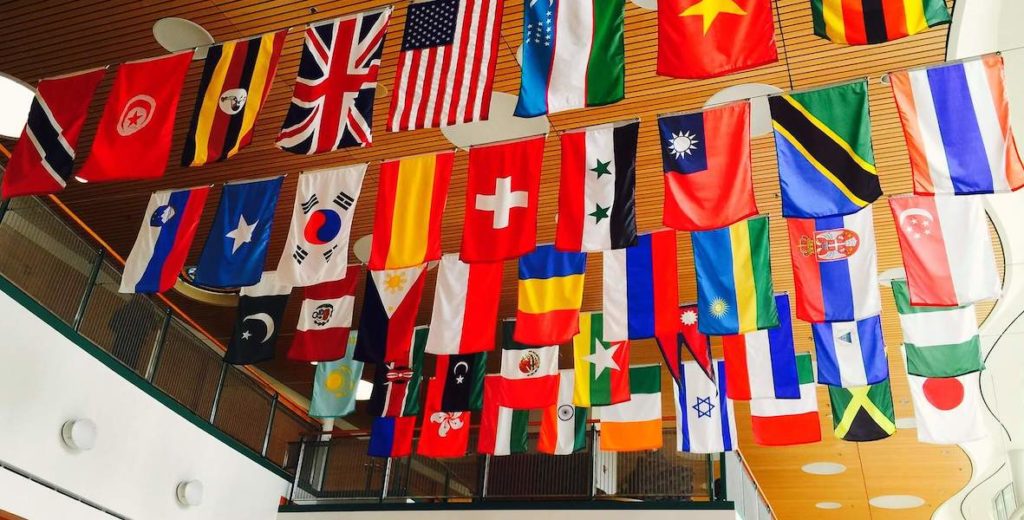The video images of a white Minneapolis police officer nonchalantly kneeling on the neck of a black man named George Floyd for nearly nine minutes, killing him, sparked a wave of protest in the United States with a ferocity unlike anything we’ve seen in 50 years.
But the force of that explosion hasn’t been contained by the oceans that flank our nation. From London to Paris to Berlin to Sydney to Tokyo, protesters took to the streets en masse, bearing signs and echoing chants proclaiming, “Black Lives Matter.” To be sure, racism is a global evil, and these marchers abroad are decrying their own countries’ legacies of discrimination and oppression against racial and ethnic minorities.
But it would be naïve not to infer an intentionality behind the use of this particular slogan. On the one hand, the demonstrators in Europe and Asia are marching in solidarity with Floyd and the countless other Black people terrorized and killed by American police. But on the other, they are levying an indictment against the United States.
On June 12, 1987, President Ronald Reagan stood in front of the Brandenburg Gate in West Berlin, and delivered a blunt exhortation to his Soviet counterpart: “Mr. Gorbachev, tear down this wall!” The demand received little attention at the moment, but when the Berlin Wall did come down two years later, presaging the imminent collapse of the Soviet Union itself, the phrase was trumpeted in all the hagiographies of the triumph of Western liberal capitalism and its Cold Warrior in Chief. As legend would have it, such was the righteous might of the United States in those days that its president could simply utter a new reality into existence.
Thirty-odd years later, the very notion of a “wall” seems like an archaic, almost quaint, concept. Information, the 21st Century’s coin of the realm cannot be contained by some rudimentary physical barrier; nor for that matter, can a deadly virus. For good and ill, information, ideas, truth and lies now move around the world at speeds and volumes that can scarcely be contained, even if those with the power to contain them were inclined to do so.
For good and ill, information, ideas, truth and lies now move around the world at speeds and volumes that can scarcely be contained, even if those with the power to contain them were inclined to do so.
It is at once ironic and fitting, then, that the current occupant of Ronald Reagan’s former residence is obsessed with walls; ironic because, unlike his conservative forebear, Pres. Donald Trump is determined to build walls, and fitting because what else is a man intellectually, temperamentally and morally unfit to meet the challenges of our time to do?
For Trump and those who share his fear of a world slipping out of their grasp, the construction of walls will not fortify America, as they argue it will. No, these walls will do nothing but stifle, constrict, insulate and shrink our country. To build a wall is to retreat while standing still.
The fixation on walls is an attempt to re-assert an atavistic reflex toward tribalism on a fully globalized planet. In an era where information means power, the old tribal leaders see threats from all sides. Around the world, the masses are beginning to recognize they are on the same side of the struggle, that too many must contend with the ravages of scarcity, while a select few hoard abundance for themselves. It’s understandable that the powerful few would construct walls to protect their vast wealth from an increasingly desperate and angry many.
Thankfully, there are small but encouraging signs that change is coming; the officers responsible for George Floyd’s death will be tried for their crimes, and some cities are now even beginning to seriously consider what it would mean to substantively reform, if not defund, their police departments. And in town squares, college quads, and other public places, offensive monuments to slave traders, Confederate generals and brutal colonizers are being toppled—occasionally with the permission of public officials.
For Trump and those who share his fear of a world slipping out of their grasp, the construction of walls will not fortify America, as they argue it will. No, these walls will do nothing but stifle, constrict, insulate and shrink our country. To build a wall is to retreat while standing still.
And while the incompetence of the Trump Administration in dealing with the coronavirus, the ensuing economic crisis, and the present civil unrest continues to exacerbate all of these crises, other forces are finding ways to surmount this wall of ineptitude. Public-private partnerships in Britain and Asia are working overtime to research and develop anti-Covid therapies at a pace and degree of collaboration unprecedented in modern times.
As pharmaceutical firms set aside competitive interests and liberal democracies (other than ours) dispense with national rivalries, the free and almost instantaneous flow of information and communication is allowing the search for a life-saving cure to advance at an almost exponential rate. The agents of change in this world will not be hemmed in by walls.
In his 1989 farewell address, delivered a few months before ordinary German people demolished the wall that had divided them for decades, Reagan described his vision of America as “the shining city on upon a hill:
In his aspirational imagining, Reagan saw America as a place where people, ideas, goods and information moved freely, enhancing life for themselves, each other, and the collective whole. And while The Great Communicator accepted the possibility of a need for walls, he pictured them with open doors.
This is the vision that we must embrace if we intend to secure a liveable, peaceful, dignified future for everyone: a world not of walls, but of open doors.
Ajay Raju, an attorney and philanthropist, is co-founder of The Citizen.

